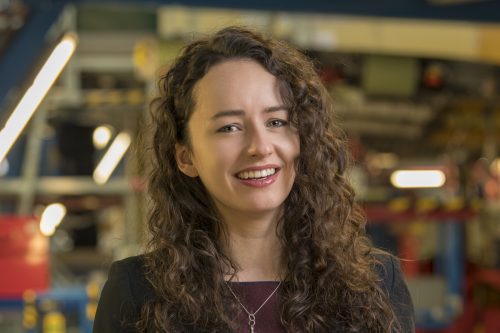Sky is the limit for Sophie

Sophie Harker is aiming high. The aerospace engineer harbours ambitions to become an astronaut.
A meeting with Dr Helen Sharman, the first British person in space, led the teenaged Sophie to recognise that becoming an aerospace engineer was a possible route to the stars.
Today she works for BAE Systems, based at its Warton operation in Lancashire, and is a member of Team Tempest, the industry partnership developing the next generation of UK combat aircraft.
As an aerodynamics and performance engineer she experiments with future concept military aircraft – using maths to work out whether designs will fly, and if they do, how fast, how far, and what can she do to improve them.
Sophie, 27, is also a shining example of the opportunities the defence giant’s training and skills programme can deliver.
She has amassed an impressive list of qualifications and awards. including gaining a 2:1 Masters in mathematics; becoming BAE Systems Technical Graduate of the Year 2016; being awarded Graduate of the Year 2017 by the Science, Engineering and Manufacturing Technologies Alliance (SEMTA) and featuring in The Daily Telegraph’s Top 50 Women in Engineering in the same year.
Sophie was also named the UK’s young women engineer of the year 2018, winning praise from Prime Minister Theresa May.
She is committed to raising the profile of the sector amongst women and to highlight the opportunities that exist for them.
She says: “It’s vital we inspire the next generation of engineers, especially women, and one way of doing this is highlighting current talent in the industry.”
A degree in maths at Nottingham was followed by a place on BAE Systems’ graduate scheme.
She became the first graduate to undertake an external placement with Reaction Engines, an Oxford-based company pioneering the next generation of hypersonic and space access propulsion, and in which BAE Systems has invested.
BAE Systems also invests around £90m a year in education, skills and early careers activities in the UK with some 2,000 apprentices in training across its businesses at any given time.
Of those, 95 per cent secure permanent roles each year. Earlier this year the business announced plans to recruit nearly 700 – a 30 per cent increase on the previous year. Almost 200 of those will be recruited at BAE Systems’ military plane-making plants in Warton and Samlesbury.
In recent years it has led sector-based employers by chairing the Apprenticeship Trailblazer Group, designing new apprenticeship standards and assessment plans.
BAE Systems has now designed 20 new aerospace, airworthiness and maritime apprenticeship standards with other employers to ensure “apprentices receive consistently high-quality training and meet the needs of large companies and SMEs”.
It has also invested in two North West Academies of Skills & Knowledge (ASK) to train and develop its workforce.
The first was opened in Samlesbury to support its air business and in 2018 celebrated delivering more than 250,000 training hours in its first year. The second, in its submarine business, was opened in Barrow-in-Furness in December.
The group believes that investing in training is a vital part of ensuring high levels of productivity in the business and its supply chain. And it points to the fact the productivity of its workforce is almost 80 per cent higher than the national average.
Charles Woodburn, its chief executive officer, says: “With technology becoming ever more advanced and integrated in the workplace, it is crucial that we train the next generation of engineers and business leaders to develop the necessary skills which will be needed to drive innovation, solve complex challenges and build on our position as one of the UK’s most innovative and productive companies.”
Ahmed Munshi, 22, is in his penultimate year of a project management apprenticeship. He says: “My apprenticeship experience has been at full speed from the beginning and really pushes me to exceed – both in my work placements and during my studies towards my degree.”









